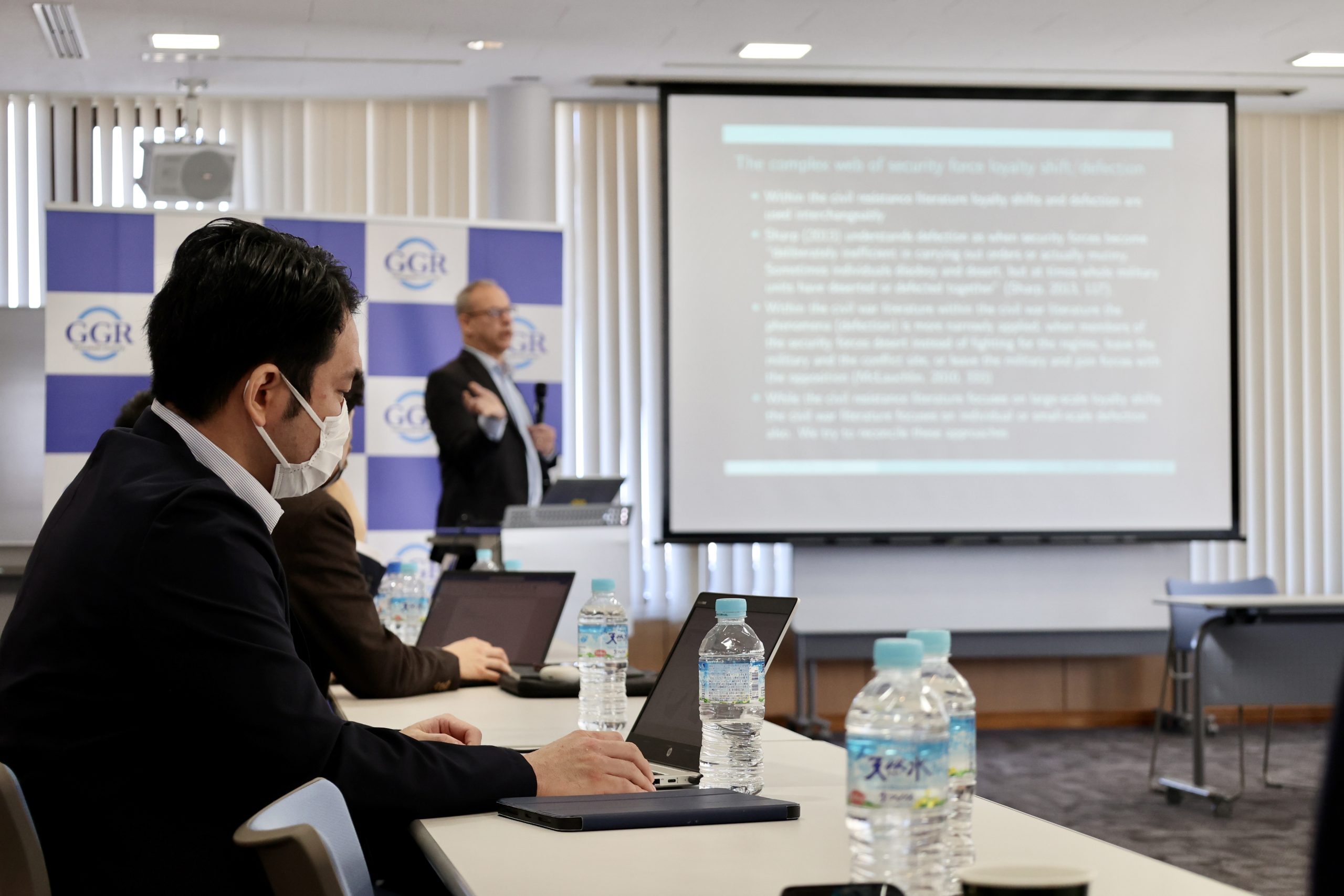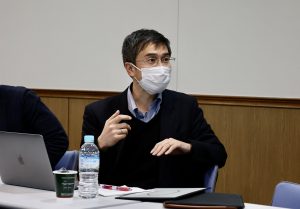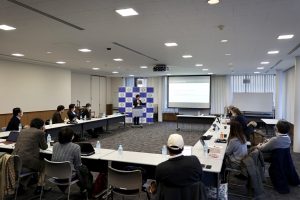On January 28, 2023, the Institute for Global Governance Research (GGR) hosted an international workshop on “State-building, Conflict and International Relations”, where around 16 scholars and students in the field of international relations gathered around the world to discuss the latest research findings.
- Session I
The first session was conducted by Dr. Krzysztof Krakowski, assistant professor at Collegio Carlo Alberto (CCA), and Dr. Naosuke Mukoyama, associate professor at Institute for Future Initiatives, University of Tokyo. Professor Krakowski presented his co-authored work titled “Cultural Diversity and State-Building: Evidence from Pakistan”. After he introduced conflicting propositions on the relationship between diverse communities and support for state-building, he posed the following question: When does a diverse community face more intergroup non-cooperation or have fears of conflict, and how does it relate to their preferences for state-making? Regarding this question, he answered with the concepts of “fractionalization” and “segregation”, in the context of the former Federal Administered Tribal Areas (FATA) region. He argued that high intergroup contact in fractionalized localities leads to more comprehensive state-building, while low intergroup contact in segregated localities leads to more security-oriented State.
In the second half of the session, Professor Mukoyama presented on “Colonial Oil and State-Making”. He reported on the reasons why, during the global decolonization and territorial reorganization after World War II, most colonies that participated in the merger project were merged, while others refused to merge and achieved independence. He compared Ras al-Khaimah, which became part of the United Arab Emirates (UAE) after gaining independence from the United Kingdom in the 1970s, with Qatar and Bahrain, which achieved independence without becoming part of the UAE. While all three areas were British protectorates and protected from foreign threats such as Saudi Arabia, only Ras al-Khaimah was not strong enough to gain independence because no oil fields were found there. Thus, Professor Mukoyama argued for attention to the impact of natural resources on sovereignty.
- Session II
The next session was followed by Dr. Scott Gates, professor at University of Oslo and a research professor at Peace Research Institute Oslo (PRIO), and Dr. Atsushi Tago, professor at the School of Political Science and Economics, Waseda University. During the first half of the session, Dr. Scott presented on “Unpacking Disloyalty: Dissent Strategies and Subversive Actions Among Security Forces”. He featured loyalty shifts among security forces with a focus on campaign outcome and particularly “non-violent” campaigns. Is a non-violence conducive to loyalty change? Complementing the conventional wisdom of civil resistance and civil war literatures, he introduced seven types of disloyalty, showing that both non-violent and violent strategies lead to different types of subversive actions. He argued that security forces are more likely to idle, voice support for the campaign, or stop supporting the regime during non-violent campaigns, but in violent campaigns, desertion and side-switching are more common.
In the second half of the session, Professor Tago presented on “Political Communication in Invisible Crises: Survey Experiments in the US and Japan”. He conducted a survey experiment to verify previous research that sending denounce messages to the other country during a crisis can increase support from citizens of third countries, rather than not commenting. The survey experiment was conducted on 2,400 Americans and Japanese nationals each, assuming an attack on the Zaporizhzhia Nuclear Power Plant in southern Ukraine, and analyzing how support for Ukraine/Russia of third countries would change depending on four scenarios: (1) Russia and Ukraine blaming each other, (2) Russia blaming Ukraine/Ukraine making no comment, (3) Russia making no comment/Ukraine blaming Russia, and (4) both Russia and Ukraine making no comment. As a result, it was confirmed that, as in previous research, both Ukraine and Russia can increase support from third counties’ citizens by sending denounce messages to the other country. In addition, it was revealed through the survey experiment that support for Ukraine among US and Japanese citizens would decrease if the US and Germany expressed different views on the situation in Ukraine.
- Session III
The last session was conducted by Dr. Yujin Woo (an assistant professor at the Graduate School of Law, Hitotsubashi University) and Dr. Kyosuke Kikuta (Institute of Developing Economies, Japan External Trade Organization). During the first half of the session, Professor Woo presented her co-authored work on “Political Regimes and Refugee Entities: The Preferences and Decisions of Displaced Persons and Host Governments”. Professor Woo called attention to dissimilar volumes and direction of refugees, addressing that refugee movements are the results of interaction between the preferences of refugees and those of recipient countries’ political elites. Professor Woo also emphasized that those preferences are formulated based upon political regime types, arguing that while democracies tend to receive a greater number of refugee status applications, those countries tend to recognize fewer refugees. This was supported by researchers’ analyses of a global data set and other statistical data.
In the second half of the last session, Dr. Kikuta presented on “Does the Nobel Peace Prize Improve Women’s Rights? Prize and Praise in International Relations”. He examined the impact of the Nobel Peace Prize on women’s rights, focusing on the role of positive symbolic action in international relations. Using natural experiments and surveys, he found that if the Nobel Peace Prize is awarded to women’s rights activists, it increases people’s trust in women’s organizations and decreases violence against women. However, these changes are short-lived and there is no evidence of institutional changes. The results suggest that symbolic actions can have real-world impact, but there is a need to find ways to sustain these changes.
【Event Report prepared by】
NAKANO Tomohito (Master’s student, School of International and Public Policy,Hitotsubashi University)
JEONG Minhee(Doctoral student, Graduate School of Law, Hitotsubashi University)
*This event is funded by the Japan Society for the Promotion of Science (JSPS) Fund for the Promotion of Joint International Research (Fostering Joint International Research) “The State Counterinsurgency Strategy and Its Constraints”.



